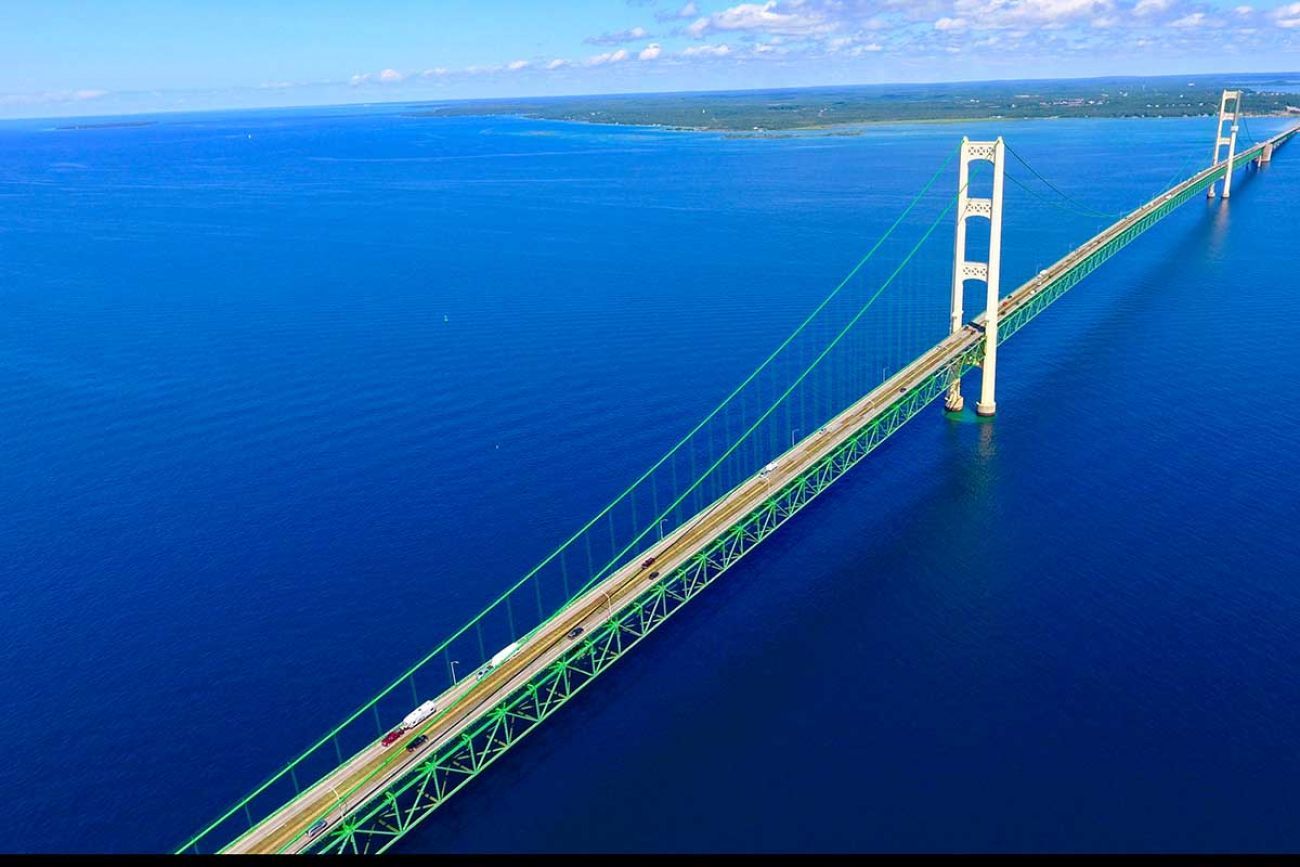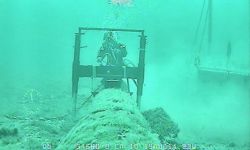Why Line 5 will likely remain open despite Democratic control of Lansing

- Line 5 has long been a partisan issue, with Democrats mostly opposing the pipeline while Republicans support it
- New Democratic leaders in Lansing say they have few plans and little power to force a shutdown
- Instead, courts and diplomats will decide Line 5’s fate
The Enbridge Line 5 pipeline was one of few environmental issues to take center stage this campaign season, with Republicans touting their stance in support of the pipeline as pro-business, and some Democrats claiming pipeline opposition among their environmental bona fides.
But don’t expect that to translate into new efforts to shut down the pipeline that runs from Wisconsin to Canada down through the Straits of Mackinac after Democrats take control in Lansing.
Instead, experts, Democratic leaders and even key Line 5 opponents say, the battle for the pipeline’s future lies mostly in federal courts and international diplomats’ negotiating rooms.
Related:
- Judge keeps Enbridge Line 5 suit in federal court, a loss for Dana Nessel
- Regulators: No Enbridge Line 5 tunnel decision without more safety info
- Gas and oil industry report projects fuel price hikes if Enbridge Line 5 is shut down
Here’s what to know about the pipeline battle as Michigan prepares for a change of political power in January.
All eyes on the courts
Gov. Gretchen Whitmer and Attorney General Dana Nessel vowed during their first campaign for office that shutting down the Canada-based Enbridge’s Line 5 pipelines would be a top priority.
Both have tried, but so far, their efforts have failed to stop the 69-year-old pipeline from transporting petroleum across the straits. The latest court developments bode well for Enbridge.
Nessel filed a lawsuit seeking a shutdown shortly after taking office, but Enbridge has since convinced a judge to remove the case to federal court, dealing a blow to the state’s legal strategy after the case had already gone through lengthy proceedings in Ingham County Circuit Court.
And after Enbridge reported “significant damage” to the anchor support of one of the dual-span pipeline’s spans in the straits in June 2020, Whitmer ordered Enbridge to cease operations in the straits by the following May, and followed up with a lawsuit in state court. Enbridge has defied that order, and successfully combated Whitmer’s lawsuit by again successfully arguing that it should be removed to federal court, prompting Nessel to drop the suit.
A countersuit by Enbridge remains in play, with the company arguing that Michigan has no legal authority to shut down the pipeline because the federal government has sole oversight of pipeline safety issues.
“The State’s attempts to shut down this critical energy infrastructure raise important federal questions of interstate commerce, exclusive federal jurisdiction over pipeline safety and the serious ramifications for energy security and foreign affairs if the State and the U.S. government were to defy an international treaty with Canada that has been in place since 1977,” Enbridge spokesperson Ryan Duffy said in an email to Bridge.
Nessel’s team still hopes to return its original suit to state court, where the state’s odds of prevailing before a state Supreme Court that has a majority of justices nominated by Democrats are better than its odds before federal courts that contain more conservative appointees.
She told Bridge in October that her team is appealing U.S. District Judge Janet Neff’s August decision to keep the case in federal court, saying she is “baffled” by the ruling.
Nessel said the removal “sets an incredibly dangerous precedent” for parties sued by the state to abruptly remove cases to federal court when proceedings in state court “aren’t going so great” for them.
While campaigning for her second term, Whitmer acknowledged the fight over Line 5 is now largely out of her hands, while maintaining that “we’ve got to get that out of the water.”
Sean McBrearty, coordinator of the anti-Line 5 campaign Oil & Water Don’t Mix, told Bridge that it’s unlikely the new Democratic majority in the Legislature will take any action designed to aid in Whitmer and Nessel’s shutdown fight.
“There was a time when the legislature was the appropriate forum for that discussion,” McBrearty said, but given that the cases are now tied up in federal court, “the time has long passed.”
Incoming House and Senate leaders haven’t signaled an appetite to wade into pipeline politics.
A spokesperson for Sen. Winnie Brinks, the incoming Senate Majority Leader, said the lawmaker is “not commenting on Line 5 at this time.” Rep. Joe Tate, who will become House Speaker on Jan. 1, didn’t respond to a request for comment.
Nick Schroeck, an environmental law expert at University of Detroit Mercy, said there may be other ways lawmakers could exert pressure on Enbridge, from imposing new insurance requirements on Enbridge to strengthening infrastructure siting requirements that apply to pipelines.
Political will to make such changes is another matter, he said, noting that unions, normally a reliable Democratic ally, generally support Enbridge’s efforts to build a tunnel under the Straits of Mackinac, putting them at odds with environmental groups.
“(Democrats) have got a majority, but it's not huge,” Shroek said. “And I'm sure there'll be pressure from unions and other stakeholders.”
Any action to preserve the pipeline or hasten its removal could alienate a key Democratic voter base, leaving Democratic candidates in tight races more vulnerable in 2024.
From a political standpoint, Shroek said, that makes it advantageous for incoming Democratic leaders in Lansing to have the pipeline battle tied up in court.
Diplomats also hold cards
With action in Lansing unlikely, Line 5 opponents are pressuring the Biden administration to shut down the pipeline, while supporters apply pressure to keep it open.
Enbridge’s fight to keep Line 5 open has hinged on an argument that federal regulators, not state officials, are responsible for regulating pipeline safety issues.
McBrearty, of the anti-Line 5 campaign, said he believes regulators at the U.S. Pipeline and Hazardous Materials Safety Administration have ample cause to order a shutdown on the grounds that Enbridge is violating Michigan law and trespassing on Native American territory in Wisconsin.
In the Wisconsin case, a federal judge ruled in September that Enbridge is trespassing on land owned by the Bad River Band of Lake Superior Chippewa, but declined to shut down the pipeline section that crosses the tribe’s reservation.
The Biden administration has so far hesitated to publicly weigh in on the pipeline fight, instead meeting in private negotiations with Canadian officials, who have twice invoked a 1977 treaty governing cross-border pipelines in response to Whitmer’s shutdown order and the Bad River Band’s lawsuit.
Canadian Foreign Affairs Minister Mélanie Joly said in August that efforts to shutdown the pipeline would cause “widespread and significant” disruptions to Canada’s economy and energy.
U.S. State Department officials have declined to answer specific questions about the talks. In an emailed response to questions from Bridge, a department spokesperson lauded the U.S. government’s close relationship with Canada, vowing to “engage constructively in the Treaty negotiations.”
Despite the federal government’s apparent hesitation to pick a side, McBrearty said he sees reason for optimism among pipeline opponents.
“We're closer now than we have been,” McBrearty said. “We've moved us up to a point where it's become an international issue.”
Pressure on the tunnel process
While the existing pipelines’ fate remains uncertain, Enbridge supporters and foes are exerting pressure on U.S. regulators who will decide whether the company can replace the existing pipeline with a new span buried in a concrete tunnel beneath the straits, as the energy company has proposed.
Enbridge has hailed the tunnel project as a solution to fears of a spill from Line 5, arguing that getting the pipeline out of the Straits’ open water would make it safer.
“With the state’s support and assistance, permits needed to build the Great Lakes Tunnel can be timely secured and we can put Michigan’s trades people to work to build this modern infrastructure,” said Duffy, the Enbridge spokesperson.
Whitmer has avoided issuing a public opinion on the tunnel, saying state and federal regulators will decide whether Enbirdge qualifies for the multiple permits it needs to start construction.
That process is expected to drag on for at least another two years.
Members of the Michigan Public Service Commission, which regulates petroleum pipelines, said in July they needed more evidence about safety, engineering and fire and explosion risks before deciding whether Enbridge can move Line 5 into the tunnel. That extends the timeline for a decision until at least next spring.
And the U.S. Army Corps of Engineers, which is studying the tunnel’s potential impact on the straits as it decides whether to approve permits for the tunnel project, doesn’t plan to make a decision on the applications until the fall of 2024.
While regulators deliberate, propane providers in the Upper Peninsula are crafting contingency plans should the existing line go offline, eliminating a transport option that now supplies about 65 percent of the U.P.’s propane, said Derek Dalling, executive director of the Michigan Propane Gas Association.
“They’re preparing for other options,” Dalling said, “and I think we’ll continue to plan that way.”
But the propane industry’s investments in rail and other transport options have so far been minimal, he said, and Line 5 remains the main source of propane in the U.P. and a major source in the Lower Peninsula.
The industry could adapt to a gradual shutdown, he said, but an abrupt shutdown would likely bring “stress and heartache, and certainly substantial price increases.” Dalling said he is not expecting any surprises.
“Everyone, at this point, is kind of wagering on it being settled in court,” he said.
Bridge Michigan reporter Lauren Gibbons contributed to this report.
Michigan Environment Watch
Michigan Environment Watch examines how public policy, industry, and other factors interact with the state’s trove of natural resources.
- See full coverage
- Subscribe
- Share tips and questions with Bridge environment reporter Kelly House
Michigan Environment Watch is made possible by generous financial support from:
Our generous Environment Watch underwriters encourage Bridge Michigan readers to also support civic journalism by becoming Bridge members. Please consider joining today.
See what new members are saying about why they donated to Bridge Michigan:
- “In order for this information to be accurate and unbiased it must be underwritten by its readers, not by special interests.” - Larry S.
- “Not many other media sources report on the topics Bridge does.” - Susan B.
- “Your journalism is outstanding and rare these days.” - Mark S.
If you want to ensure the future of nonpartisan, nonprofit Michigan journalism, please become a member today. You, too, will be asked why you donated and maybe we'll feature your quote next time!






